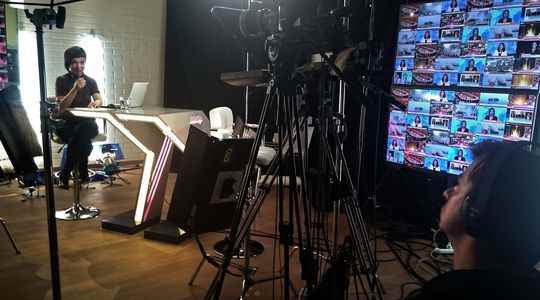What is it to be a freelance journalist in Russia? Tikhon Dzyadko, 34, was editor-in-chief of Dojd, Russia’s leading opposition television channel, for two and a half years. Even before the adoption of the law “against false information” by the Russian Parliament, he preferred to leave the country. He and his family took the first flight to Istanbul, Turkey on March 2 before heading to Georgia. The climate for the media has indeed been drastically tense since the start of the offensive. Several media have stopped working, including his television channel.
L’Express: You had to make the decision to stop broadcasting your programs and to flee your country a few days after the start of the offensive. How did you experience it and why did you decide to do it?
Tikhon Dzyadko: It’s humbling because we didn’t do anything wrong and were just doing our job. We are not criminals. Only journalists who report the facts and who inform the Russians about what is happening. We were talking about war because it is indeed a war. It was therefore not an easy choice to leave everything overnight. Only, on March 1, our website as well as that of the independent radio station Echo of Moscow were blocked by Roskomnadzor (the Russian telecommunications policeman, editor’s note).
We knew it was only a matter of days before a new law called “against false information” was passed. From there, we only had two options. Either become the press service of the Ministry of Defense and relay the information communicated by the army, or tell the truth, respect the contradictory, but risk fifteen years in prison. Neither of the two paths seemed tenable to us.
We therefore decided to stop our programs on March 3rd. It was heartbreaking. Since 2010, we had worked hard to make Dojd the medium it had become. 18 million people followed our programs every month on our Internet platforms. Our business model was based 65% on donations and subscriptions from viewers.
Yet you have been used to working under pressure as an independent media…
Yes it’s sure. Our work has never pleased official sources. In 2014, our media coverage of the pro-European uprising in Ukraine, Maidan, did not particularly please them. They took the pretext of the distribution of a survey (devoted to the usefulness of the siege of Leningrad and its defense during the Second World War, Editor’s note), to exclude Dojd from the main Russian cable and satellite network. At the time, we encountered significant financial difficulties and we lost a lot of audience too. We have come back from 2020 when our programs were released on YouTube.
In August 2021, as the legislative elections approached, the authorities classified us as a “foreign agent”. It was also a big challenge. It was necessary before each publication, each video, to specify that we were “agent of the foreigner”. It was extremely painful and tedious. Even if paradoxically it strengthened our audience.
But since the start of the offensive in Ukraine, it’s out of proportion. As a freelance journalist, I had never been personally threatened. There my phone number was leaked on the internet. I started to receive threatening messages from March 1 telling me, for example, “that I was going to be found”.
Do you think today that the Russian people are aware of what is happening in Ukraine?
It is very complicated to answer this question. Russia is a very fractured country. And access to information is very unequal. For example, some people have a VPN to bypass censorship. Today, the latter can therefore continue to obtain information through the independent media. But others get their news only from the state media and prefer to stay in denial or support Vladimir Putin.
The whole world has seen these images. On the first Russian television channel, a journalist held up a sign saying no to war in Ukraine and alerting viewers to state propaganda. Are you worried today for your colleague Marina Ovsyannikova and do you think that this sequence can have an impact on Russian public opinion?
It is still too early to tell. I can only say that she was very brave. His gesture will undoubtedly remain one of the strong symbols of anti-war protests in Russia. But we cannot predict in advance the impact of such a scene.
Today, how do you envision your future?
I’m thinking of staying in Georgia first. We won’t be going back to Russia anytime soon. What is certain, however, is that with my former colleagues, we want to continue to inform the Russians. It is our country. We are currently working to develop a media project, which will be both free and independent, and which will operate from a foreign country. There is a real demand from our former subscribers.
